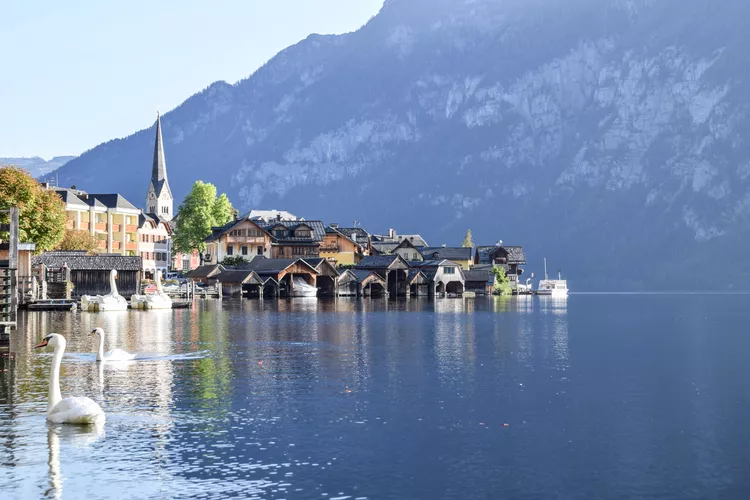Summary
Visit a Fascinating UNESCO World Heritage Site
Hallstatt, Austria has a rich historical background, having been occupied since the Iron Age. Around 7000 years ago, people discovered the salt mines, leading to the establishment of a trade center. This colorful cultural history is the foundation for Hallstatt’s designation as a UNESCO World Heritage Site. For travelers fascinated by lakeside archaeology, Hallstatt offers a wealth of discoveries, including several museums and archaeological tours of the salt mine.
Additionally, the region’s stunning beauty draws numerous hikers and trekkers. Well-marked trails guide visitors to captivating destinations throughout the mountainous terrain of Austria.
Shoppers may find a variety of gourmet salt, bath salts, and decorative lights crafted from large salt crystals to take home as souvenirs.
Where is Hallstatt, and How Do You Get There?
Hallstatt is situated in the Salzkammergut Region of Austria, southeast of Salzburg, along the picturesque shores of Lake Hallstätter. Since there are no direct trains from Salzburg to Hallstatt, travelers planning a day trip should visit a local travel agency for information on direct bus journeys. Alternatively, one can take a bus from Bad Ischl to Hallstatt.
For those traveling by train, Hallstatt is accessed via a small ferry, as the train station is located across the lake. This scenic ferry ride provides a memorable first glimpse of the idyllic town.
Travelers interested in rail options may want to explore various Austrian Rail Passes. Moreover, a combined pass for Germany and Austria is available for those intending to explore both countries.
For those driving, exit the A10 at Golling and follow the B-126 to Gosau, then signs will guide you to Hallstatt. It is important to note that Hallstatt signage appears only after reaching Gosau.
A local taxi service, Taxi Godl, is available for convenient transportation within the area, including to hiking trails, with English-speaking drivers for added convenience.
Population of Hallstatt
With a population of fewer than 1000 residents, Hallstatt is a small town. Despite its limited size, parking can become challenging during the bustling summer season, with several public lots available and informative signs along the roads indicating their status.
What to Do in Hallstatt
A must-see is the funicular that takes visitors up the hill to the salt mines, located near the site of an excavated Iron Age cemetery. Archaeologists have created experimental facilities to explore ancient preservation techniques, including salting as a method for preserving pork, which was tested with up to 150 pigs at once.
The salt mines, known as “Salzwelten” or “Salt Worlds,” represent the top attraction in Hallstatt. Guests will learn about the salt mining process, view ancient tools, and discover the fascinating “Man in Salt,” a notable preservation method.
For those intrigued by history, Hallstatt features the “Beinhaus,” or “Bone House.” Due to limited burial space between the mountains and the lake, the town’s deceased were exhumed after a period and their bones decorated and stored for future use.
There are two museums worth visiting during the summer. The Prehistoric Museum showcases artifacts from bronze and iron age graves, while the Folk Museum (Heimatmuseum) displays more recent historical finds.
Nearby Obertraun is just a flat 4-km walk away and boasts ice caves that are open for exploration. In summer months, concerts are occasionally held within these caverns.
Nature enthusiasts can appreciate the stunning vistas surrounding Hallstatt, and those who enjoy naturism can visit the well-marked FKK nude beach located near the campground, conveniently situated on the road between Hallstatt and Obertraun.
Nearby Attractions
If you have an appetite for more salt mine experiences, the Altaussee Salt Mines are a short drive or bus ride away. This site, known as the “mountain of treasures,” became famous for the recovery of over 6,500 looted art objects by the Monuments Men during World War II.
Where to Stay
During the summer season, accommodation in Hallstatt can be limited. Given the flat, walkable layout around the lake, staying in the countryside may offer a more pleasant experience; consider checking out Salzkammergut Vacation Rentals for options.
Pictures of Hallstatt, Austria
Explore this stunning area through our Hallstatt Picture Gallery.
Other Beautiful Lakes in Europe
If you’re captivated by Hallstatt’s lakeside charm, explore our recommendations for the Best European Lakes to Experience.
Coach Tour From Salzburg
For those looking for a hassle-free trip, Viator provides a convenient Hallstatt Tour from Salzburg. This half-day excursion offers highlights such as:
You can take a mountain train up to the world’s oldest salt mine for incredible views, stroll around Lake Hallstatt, admire the Mühlbach Waterfall, and discover the remarkable Beinhaus (Bone House).





